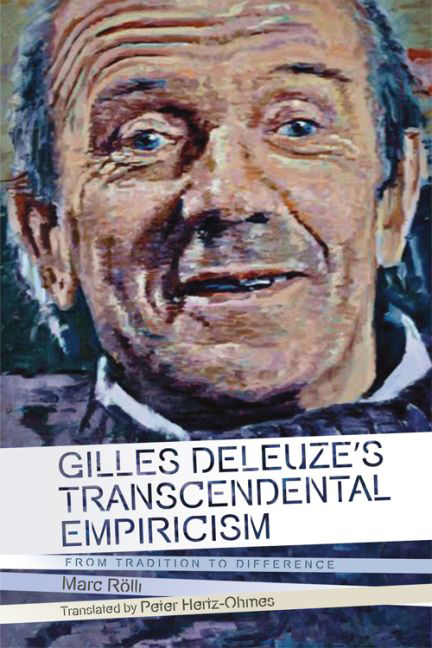Book contents
- Frontmatter
- Contents
- Translator's Note
- Author's Foreword
- Introduction: Can Empiricism Have a Transcendental Aspect?
- PART I EMPIRICISM/TRANSCENDENTALISM
- 1 Hume's Logic of External Relations
- 2 The Ambiguity of Kantian Thought
- 3 Kant's Transcendental Critique of Classical Empiricism
- PART II FROM PHENOMENON TO EVENT
- PART III DELEUZE'S TRANSCENDENTAL EMPIRICISM
- Conclusion: Where Do We Go from Here? Lines of Flight
- Bibliography
- Index
3 - Kant's Transcendental Critique of Classical Empiricism
from PART I - EMPIRICISM/TRANSCENDENTALISM
Published online by Cambridge University Press: 27 April 2017
- Frontmatter
- Contents
- Translator's Note
- Author's Foreword
- Introduction: Can Empiricism Have a Transcendental Aspect?
- PART I EMPIRICISM/TRANSCENDENTALISM
- 1 Hume's Logic of External Relations
- 2 The Ambiguity of Kantian Thought
- 3 Kant's Transcendental Critique of Classical Empiricism
- PART II FROM PHENOMENON TO EVENT
- PART III DELEUZE'S TRANSCENDENTAL EMPIRICISM
- Conclusion: Where Do We Go from Here? Lines of Flight
- Bibliography
- Index
Summary
It is common anecdotal knowledge that Kant awoke from his dogmatic slumber thanks to Hume's scepticism. Inversely, a seldom articulated hope lies hidden in the name ‘transcendental empiricism’: could empiricism possibly profit from the same transcendental method that is meant to override it? Deleuze does in fact attempt to modify empiricist theory with a philosophically transcendental approach. Our engagement with Kant stands under this directive. It entails neither a retreat from Kant nor the simple adoption of his critique of empiricism. Rather, armed with relevant Deleuzian deliberations, the transcendental critique will – as far as possible – be assimilated empirically, whereby the ‘leftovers’ that cannot be integrated will undergo a further empiricist critique. In short, putting Kant's position on the scales should lead to two results: to adopt philosophically transcendental components for the empiricist theory and in the process convincingly prevent turning the empiricist project as such into an impossibility.
The transcendental critique of empiricist philosophy will be presented in what follows in such a way that its positive incentives for promoting further advances in empiricism are distinguishable from its obstructive and dogmatic aspects. As textual reference, the chapter on the transcendental deduction in the Critique of Pure Reason commends itself, since it bears upon the theoretical principles of empiricism. In that chapter Kant contrasts his concept of experience with the empiricist doctrine of association. The deductive argument for the objective reality of categories tries in a typically transcendental way to override empiricism and its sceptical consequences. Not for nothing do the debates over the possibility of transcendental philosophy revolve around this segment of theory. Since the reconstruction of the transcendental deduction which I am presenting here primarily rests on the distinction between two stages of the proof in the B-edition, namely the distinction between intellectual and figural synthesis, Kant's counter-empiricist arguments will be introduced and criticised in two successive steps. This will uncover the fundamental structure of the transcendental argument as it tries to refute Humean epistemological scepticism. I want to make clear that although Kant fails in the end to carry out his proof, he manages along the way not only to expose inconsistencies in English empiricism but also to develop theoretical starting points for resolving them beneficially.
- Type
- Chapter
- Information
- Gilles Deleuze's Transcendental EmpiricismFrom Tradition to Difference, pp. 51 - 92Publisher: Edinburgh University PressPrint publication year: 2016



